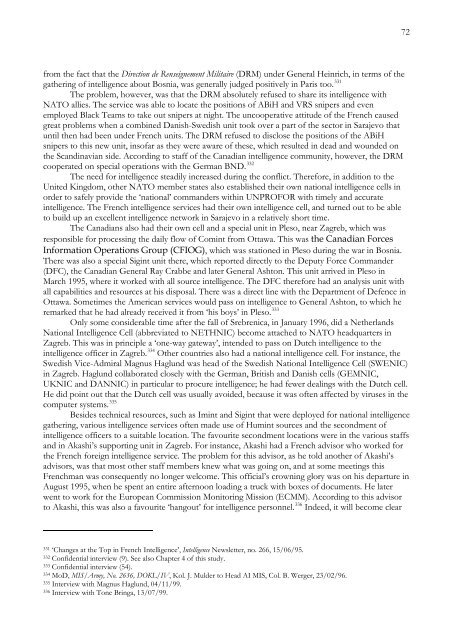C. Wiebes - Intelligence en de oorlog in Bosnië 1992-1995. De rol van de inlichtingen- en veiligheidsdiensten - Engels
C. Wiebes - Intelligence en de oorlog in Bosnië 1992-1995. De rol van de inlichtingen- en veiligheidsdiensten - Engels
C. Wiebes - Intelligence en de oorlog in Bosnië 1992-1995. De rol van de inlichtingen- en veiligheidsdiensten - Engels
- No tags were found...
You also want an ePaper? Increase the reach of your titles
YUMPU automatically turns print PDFs into web optimized ePapers that Google loves.
72from the fact that the Direction <strong>de</strong> R<strong>en</strong>seignem<strong>en</strong>t Militaire (DRM) un<strong>de</strong>r G<strong>en</strong>eral He<strong>in</strong>rich, <strong>in</strong> terms of thegather<strong>in</strong>g of <strong>in</strong>tellig<strong>en</strong>ce about Bosnia, was g<strong>en</strong>erally judged positively <strong>in</strong> Paris too. 331The problem, however, was that the DRM absolutely refused to share its <strong>in</strong>tellig<strong>en</strong>ce withNATO allies. The service was able to locate the positions of ABiH and VRS snipers and ev<strong>en</strong>employed Black Teams to take out snipers at night. The uncooperative attitu<strong>de</strong> of the Fr<strong>en</strong>ch causedgreat problems wh<strong>en</strong> a comb<strong>in</strong>ed Danish-Swedish unit took over a part of the sector <strong>in</strong> Sarajevo thatuntil th<strong>en</strong> had be<strong>en</strong> un<strong>de</strong>r Fr<strong>en</strong>ch units. The DRM refused to disclose the positions of the ABiHsnipers to this new unit, <strong>in</strong>sofar as they were aware of these, which resulted <strong>in</strong> <strong>de</strong>ad and woun<strong>de</strong>d onthe Scand<strong>in</strong>avian si<strong>de</strong>. Accord<strong>in</strong>g to staff of the Canadian <strong>in</strong>tellig<strong>en</strong>ce community, however, the DRMcooperated on special operations with the German BND. 332The need for <strong>in</strong>tellig<strong>en</strong>ce steadily <strong>in</strong>creased dur<strong>in</strong>g the conflict. Therefore, <strong>in</strong> addition to theUnited K<strong>in</strong>gdom, other NATO member states also established their own national <strong>in</strong>tellig<strong>en</strong>ce cells <strong>in</strong>or<strong>de</strong>r to safely provi<strong>de</strong> the ‘national’ comman<strong>de</strong>rs with<strong>in</strong> UNPROFOR with timely and accurate<strong>in</strong>tellig<strong>en</strong>ce. The Fr<strong>en</strong>ch <strong>in</strong>tellig<strong>en</strong>ce services had their own <strong>in</strong>tellig<strong>en</strong>ce cell, and turned out to be ableto build up an excell<strong>en</strong>t <strong>in</strong>tellig<strong>en</strong>ce network <strong>in</strong> Sarajevo <strong>in</strong> a relatively short time.The Canadians also had their own cell and a special unit <strong>in</strong> Pleso, near Zagreb, which wasresponsible for process<strong>in</strong>g the daily flow of Com<strong>in</strong>t from Ottawa. This was the Canadian ForcesInformation Operations Group (CFIOG), which was stationed <strong>in</strong> Pleso dur<strong>in</strong>g the war <strong>in</strong> Bosnia.There was also a special Sig<strong>in</strong>t unit there, which reported directly to the <strong>De</strong>puty Force Comman<strong>de</strong>r(DFC), the Canadian G<strong>en</strong>eral Ray Crabbe and later G<strong>en</strong>eral Ashton. This unit arrived <strong>in</strong> Pleso <strong>in</strong>March 1995, where it worked with all source <strong>in</strong>tellig<strong>en</strong>ce. The DFC therefore had an analysis unit withall capabilities and resources at his disposal. There was a direct l<strong>in</strong>e with the <strong>De</strong>partm<strong>en</strong>t of <strong>De</strong>f<strong>en</strong>ce <strong>in</strong>Ottawa. Sometimes the American services would pass on <strong>in</strong>tellig<strong>en</strong>ce to G<strong>en</strong>eral Ashton, to which heremarked that he had already received it from ‘his boys’ <strong>in</strong> Pleso. 333Only some consi<strong>de</strong>rable time after the fall of Srebr<strong>en</strong>ica, <strong>in</strong> January 1996, did a NetherlandsNational <strong>Intellig<strong>en</strong>ce</strong> Cell (abbreviated to NETHNIC) become attached to NATO headquarters <strong>in</strong>Zagreb. This was <strong>in</strong> pr<strong>in</strong>ciple a ‘one-way gateway’, <strong>in</strong>t<strong>en</strong><strong>de</strong>d to pass on Dutch <strong>in</strong>tellig<strong>en</strong>ce to the<strong>in</strong>tellig<strong>en</strong>ce officer <strong>in</strong> Zagreb. 334 Other countries also had a national <strong>in</strong>tellig<strong>en</strong>ce cell. For <strong>in</strong>stance, theSwedish Vice-Admiral Magnus Haglund was head of the Swedish National <strong>Intellig<strong>en</strong>ce</strong> Cell (SWENIC)<strong>in</strong> Zagreb. Haglund collaborated closely with the German, British and Danish cells (GEMNIC,UKNIC and DANNIC) <strong>in</strong> particular to procure <strong>in</strong>tellig<strong>en</strong>ce; he had fewer <strong>de</strong>al<strong>in</strong>gs with the Dutch cell.He did po<strong>in</strong>t out that the Dutch cell was usually avoi<strong>de</strong>d, because it was oft<strong>en</strong> affected by viruses <strong>in</strong> thecomputer systems. 335Besi<strong>de</strong>s technical resources, such as Im<strong>in</strong>t and Sig<strong>in</strong>t that were <strong>de</strong>ployed for national <strong>in</strong>tellig<strong>en</strong>cegather<strong>in</strong>g, various <strong>in</strong>tellig<strong>en</strong>ce services oft<strong>en</strong> ma<strong>de</strong> use of Hum<strong>in</strong>t sources and the secondm<strong>en</strong>t of<strong>in</strong>tellig<strong>en</strong>ce officers to a suitable location. The favourite secondm<strong>en</strong>t locations were <strong>in</strong> the various staffsand <strong>in</strong> Akashi’s support<strong>in</strong>g unit <strong>in</strong> Zagreb. For <strong>in</strong>stance, Akashi had a Fr<strong>en</strong>ch advisor who worked forthe Fr<strong>en</strong>ch foreign <strong>in</strong>tellig<strong>en</strong>ce service. The problem for this advisor, as he told another of Akashi’sadvisors, was that most other staff members knew what was go<strong>in</strong>g on, and at some meet<strong>in</strong>gs thisFr<strong>en</strong>chman was consequ<strong>en</strong>tly no longer welcome. This official’s crown<strong>in</strong>g glory was on his <strong>de</strong>parture <strong>in</strong>August 1995, wh<strong>en</strong> he sp<strong>en</strong>t an <strong>en</strong>tire afternoon load<strong>in</strong>g a truck with boxes of docum<strong>en</strong>ts. He laterw<strong>en</strong>t to work for the European Commission Monitor<strong>in</strong>g Mission (ECMM). Accord<strong>in</strong>g to this advisorto Akashi, this was also a favourite ‘hangout’ for <strong>in</strong>tellig<strong>en</strong>ce personnel. 336 In<strong>de</strong>ed, it will become clear331 ‘Changes at the Top <strong>in</strong> Fr<strong>en</strong>ch <strong>Intellig<strong>en</strong>ce</strong>’, <strong>Intellig<strong>en</strong>ce</strong> Newsletter, no. 266, 15/06/95.332 Confid<strong>en</strong>tial <strong>in</strong>terview (9). See also Chapter 4 of this study.333 Confid<strong>en</strong>tial <strong>in</strong>terview (54).334 MoD, MIS/Army, No. 2636, DOKL/IV, Kol. J. Mul<strong>de</strong>r to Head AI MIS, Col. B. Werger, 23/02/96.335 Interview with Magnus Haglund, 04/11/99.336 Interview with Tone Br<strong>in</strong>ga, 13/07/99.





